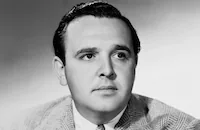For the Love of Mike
Cast & Crew
Frank Capra
Claudette Colbert
Ben Lyon
George Sidney
Ford Sterling
Hugh Cameron
Film Details
Technical Specs

Synopsis
A not yet one-year-old boy, abandoned on a landing in a tenement house in New York's "Hell's Kitchen," is adopted by three men who live on that floor: German delicatessen owner Herman Schultz; Jewish tailor Abie Katz; and Irish street cleaner Patrick O'Malley. The men, although ignorant in the ways of infants, rear the child, whom they call "Mike." After the boy finishes high school, they plan to send him to college, but Mike wants to work rather than be a burden to them any longer. However, when Mary, their Italian-American neighbor who works as Herman's cashier, joins the men in trying to convince Mike otherwise, he agrees to go to Yale. On his twenty-first birthday, the three "fathers" have prepared a lavish banquet for Mike, now captain of the varsity crew and very popular, so that he could meet leading politicians, bankers and businessmen who might offer him a good job. Before going to the banquet, Mike gets drunk at a cocktail party to which he is lured by Evelyn Joyce, who is attracted to him. When he finally arrives at the banquet, the prominent people leave, insulted by his drunken behavior. When Mike later angrily turns against his three fathers, Patrick knocks him out. Back at college, Mike begins to gamble and gets in debt to Henry Sharp, a crooked gambler. Sharp threatens to have Mike arrested for writing a bad check unless he throws the upcoming Yale-Harvard crew race, but when Mike sees that his three fathers and Mary have come and are betting on him, he rows the team to victory. When Sharp threatens the fathers with sending Mike to jail, they push him overboard. Mike, now acclaimed by his school, forgiven by his fathers and loved by Mary, happily paddles to the crew house.

Director

Frank Capra
Cast

Claudette Colbert
Ben Lyon

George Sidney

Ford Sterling
Hugh Cameron
Richard "skeets" Gallagher
Rudolph Cameron
Mabel Swor
Crew

Film Details
Technical Specs

Quotes
Trivia
Frank Capra considered this the worst movie of his career.
When this film was completed there was no money left to pay the director so he had to hitchhike back to Hollywood from New York City.
Notes
The film's working title was Hell's Kitchen. The above plot summary was based on press material in the copyright descriptions and reviews. Sources conflict concerning the scenarist: while information in the copyright descriptions, possibly taken from a print of the film, credits J. Clarkson Miller, the Film Daily review credits Leland Hayward [although his name is mistakenly spelled "Heywood"]. According to Variety, there were two shots in the film that May have come from newsreels: a "melting pot" shot at the beginning of the film; and an airplane shot of the regatta. This was Claudette Colbert's first film. According to modern sources, she starred in the Broadway play The Barker in the evenings during the production schedule and vowed not to make any more films afterward.
Modern sources also note that Benny Rubin stated he wrote gags for the film, that the running time was 75 min. and that prints from the film no longer survive. In his autobiography, Capra states that Leland Hayward was the production manager and Joe Boyle the assistant director. He also notes that the film was shot at the Hearst-Cosmopolitan studio in New York and on location in Connecticut; that the budget was inadequate and he was not paid, due to financial difficulties of producer Robert Kane; and that because the film was a commercial failure, he returned to the Mack Sennett studio as a writer.












